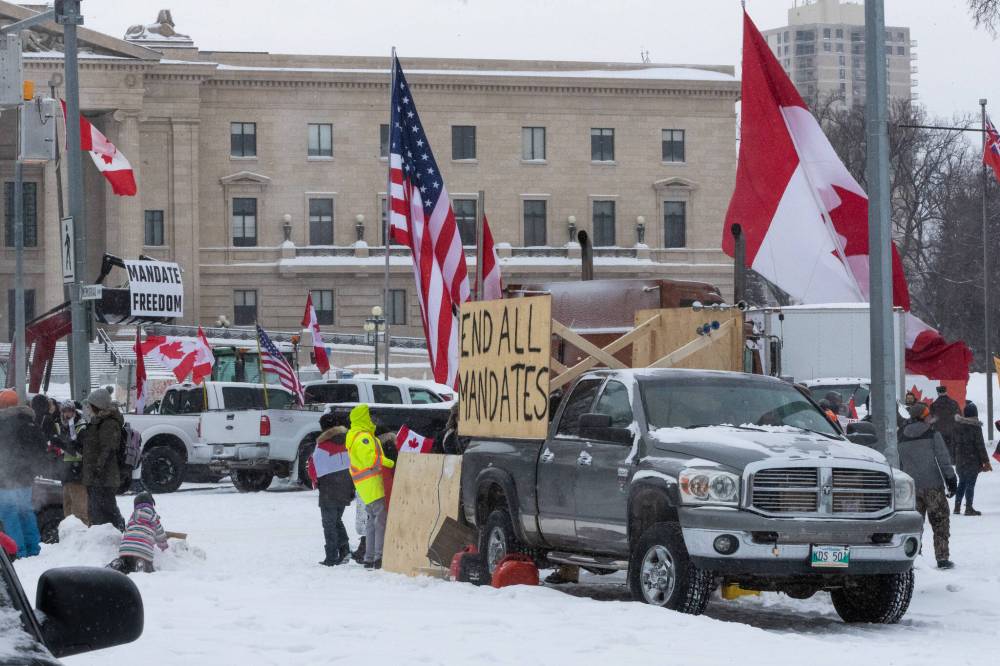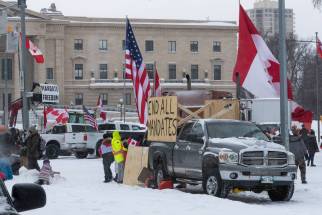Security bill strikes reasonable balance
Read this article for free:
or
Already have an account? Log in here »
To continue reading, please subscribe:
Monthly Digital Subscription
$0 for the first 4 weeks*
- Enjoy unlimited reading on winnipegfreepress.com
- Read the E-Edition, our digital replica newspaper
- Access News Break, our award-winning app
- Play interactive puzzles
*No charge for 4 weeks then price increases to the regular rate of $19.00 plus GST every four weeks. Offer available to new and qualified returning subscribers only. Cancel any time.
Monthly Digital Subscription
$4.75/week*
- Enjoy unlimited reading on winnipegfreepress.com
- Read the E-Edition, our digital replica newspaper
- Access News Break, our award-winning app
- Play interactive puzzles
*Billed as $19 plus GST every four weeks. Cancel any time.
To continue reading, please subscribe:
Add Free Press access to your Brandon Sun subscription for only an additional
$1 for the first 4 weeks*
*Your next subscription payment will increase by $1.00 and you will be charged $16.99 plus GST for four weeks. After four weeks, your payment will increase to $23.99 plus GST every four weeks.
Read unlimited articles for free today:
or
Already have an account? Log in here »
Hey there, time traveller!
This article was published 19/07/2022 (1236 days ago), so information in it may no longer be current.
Manitoba’s Progressive Conservative government has set out new rules that ban encampments, blockades and vandalism on the grounds of the Legislative Building.
Amendments to the Legislative Security Act, passed earlier this year, come in the wake of a three-week protest in front of the legislature in February that saw dozens of large vehicles clog Memorial Boulevard and block the front entrance to the grounds of the building. While the noisy and disruptive occupation was likely the chief impetus behind tightening security around Manitoba’s seat of government, the changes were long overdue.
The number and size of encampments springing up around the building, including across the street in Memorial Park (part of the legislature’s “precinct”), have grown in recent years. Groups are staying longer and their resolve is growing stronger.

One group has been camped out on the east side of the building, in tents and wooden structures, for well over a year.
Normally, in a free and democratic society, such determination to effect political change should be embraced. People have the right to hold their governments accountable and should be encouraged to do so.
However, these encampments pose a health and public safety hazard. Many of those involved build fires to cook and stay warm. Some bring flammable substances, such as propane. The grounds of the legislature are not designed to provide people with running water or washroom facilities for overnight stays.
Moreover, security is compromised when potentially hazardous or dangerous items could be concealed in large tents or structures close to the legislative building, in some cases only a few dozen metres from ministers’ office windows. It is reasonable to expect a high level of security around the seat of government.
Until recent changes to the Legislative Security Act, there were no specific rules preventing encampments or blockades around the legislature. The amendments allow cabinet to establish those regulations, which it did earlier this month. Among the changes, people are prohibited from setting up tents or other portable shelters; bringing in trailers, firewood, or portable toilets; and lighting fires.
It is now an offence to impede access to the grounds of the legislature with a vehicle. Failure to comply with the regulations may result in eviction from the grounds and a fine up to $5,000.
The new rules do not prevent people from holding peaceful demonstrations on the grounds of the legislature.
As with all laws, police and security officials will have the discretion to enforce the new rules as they see fit. It is curious, then, that the Stefanson government chose to include a clause in the regulations that allows the chief legislative security officer (a newly-created position under the act) to issue written exemptions for some groups or individuals.
Such a loophole could raise the spectre of political favouritism if one group is allowed to occupy the grounds and another is not. Even the perception of political favouritism could undermine the legitimacy of the regulations, especially since there are no stated criteria to determine when an exception can be made and when it should be denied.
It would have been preferred to not include any exemptions in the regulations and allow law enforcement officials to use the discretion they normally employ.
As for the rest, the new regulations are a reasonable response to a growing problem that needed to be addressed. Police and security officials now have the tools they need to strike a balance between public safety and the right to peaceful assembly.










